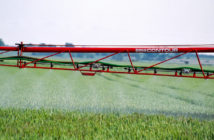At its annual conference this month, the Rural Policy Group, a think tank campaigning for better representation of farming and agriculture in British politics, outlined a broken food supply system with unfair distribution of value in the supply chain that leaves farmers at risk of failure and the country in a position of food insecurity. This in turn presents a barrier to the country’s Net Zero goals, while unhealthy imports puts the health of the population at risk, adding long-term cost to the NHS, it claimed in its manifesto on Shaping the Future of the Rural Economy.
Speaking at the conference, Baroness Natalie Bennett of Manor Castle who previously served as leader of the Green Party, said “The food system is broken. It only works for a handful of multinational companies who have no real competition. As a country, we are investing heavily in infrastructure but not food and agriculture. It’s all hard concrete; roads and railways. Yet food is a basic need, and we shouldn’t rest until people can meet their most basic needs.”
The Rural Policy Group aims to shine a light on the key issues of food security, return on investment for farmers and producers and the essential issues around more sustainable agricultural and rural businesses to maximise the contribution that farming can make in reducing the nation’s carbon footprint.
Chair of The Rural Policy Group, Mark Lumsdon-Taylor, says: “While the Government has just announced its food strategy as a blueprint for how it will back farmers, to date there have been no policies. Health, energy, transport, technology and climate are all big areas of focus for our Government and while that is not wrong, food is a basic need and we need to get it right. It should be a long-term strategy, rather than a reaction to the immediate shortages posed by the war in Ukraine. Our policies on food are critical to both the health of the nation and our net zero targets. If we don’t focus on food, we risk everything else that we invest in health and climate.
In the UAE farming sits alongside health and under the umbrella of the Ministry of the Economy for a good reason. The immense cost of running our National Health Service could be improved through getting the food basics right and backing sustainable home production.”
Rural Policy Group’s report shows that agriculture and food production contribute £11bn to the UK economy, but combined with food and drink supply chain it swells to £127bn, which is around 7.2% contributed to the net economy.
MHA MacIntyre Hudson recently valued Kent’s rural net assets for The Rural Policy Group at £7.587 billion. If it was listed in the FTSE it would rank 4t8h, above J Sainsbury’s £5.58bn valuation.
Tim Farron, Liberal Democrat MP for Cumbria added: “We are putting people’s health at risk if we source food from other, often under-developed, countries. Being more sustainable also requires us to consider issues such as how we push up the price of food up in those countries when we import from them. We have a duty of care. Investment in national farming is essential. We give golden goodbyes but no golden hellos. We will not get people to commit to long-term investment if they are terrified of survival.”
Phil Acock is Chairman and managing director of Fourayes Farm, the UK’s number one grower and processor of fruit. He said: “All we ever debate is the price of food, but compared to other countries in Europe, our food is not expensive. We don’t value the food that we produce and there is a very real hidden cost in keeping the price of food low both in terms of quality and the impact that low-quality food can have on our health.”
Rachel Hudd, Partner at MHA Macintyre Hudson, chartered accountants, tax and business advisor to many rural businesses, outlined the challenges being faced by farmers still grappling with Brexit and the Ukraine war. She said: “When the Basic Payment Scheme ends, nearly half of farms will be loss-making, which will have severe impacts on employment, the countryside and the accessibility of nutritious food as part of the national diet. The new Environmental Land Management Scheme (ELMS) just doesn’t cut it.
How can farmers go green while they are in the red.
There is simply not enough support for farmers today to make a living let alone invest in being more sustainable. Investing in renewable energy shouldn’t put farmers into a negative tax position.”
The Rural Policy Group’s report highlights that good food is costly to produce. It suggests that we need to change the narrative, recognise the value of farming to our economy, our environment and our health, and source and recognise its value in the food chain.
Baroness Bennett suggested that there is a knowledge drought in our agri-economy. “Most consumers don’t fully see the value of sustainable farming and the role that farmers play in managing the land or how good farming practices mean that the food we eat is better for us. There is a huge opportunity for better sharing of best practice. We need to work together to solve this crisis.”
Mr Lumsdon-Taylor concluded: “The first step to a sustainable UK is to encourage farmers to stay on their land with a framework of policies which support profitable food production and better distribution of value in the upstream and downstream food supply chain.
With a stable core business, attentions can turn to diversification opportunities in renewable and sustainable energy generation, carbon capture, utilisation and storage and biofuel production.”
The Rural Policy Group’s Annual Report, Shaping the Future of the Rural Economy, including its call to action is accessible here. You can watch conference sessions here.




